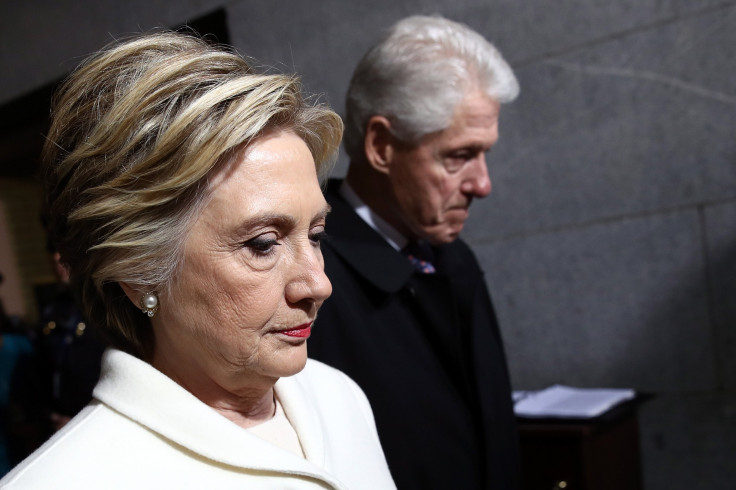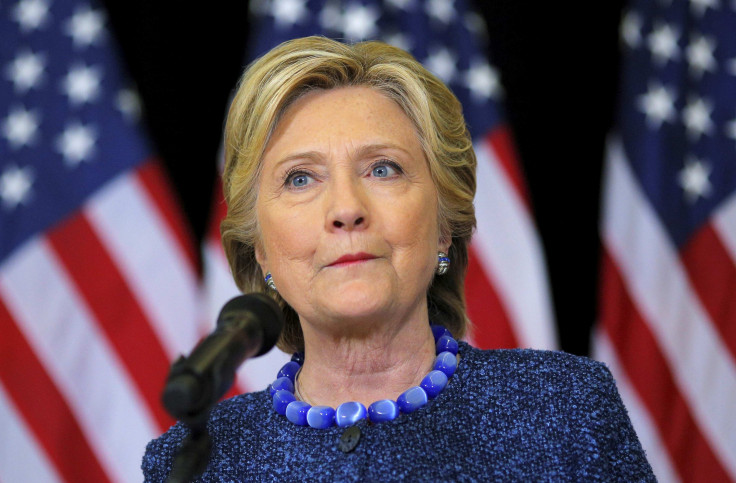Trump FBI Revives Investigation Into Clinton Foundation Donations: The Key Allegations

More than a year after the presidential election, the Department of Justice launched a new investigation into the Clinton Foundation to determine whether donations from foreign entities to the non-profit were tied to Hillary Clinton’s actions as Secretary of State. A prior investigation into the matter was scuttled during the 2016 campaign.
Questions about conflicts of interest resulting from foreign and corporate donations to the foundations have dogged the Clintons for years. While Hillary Clinton oversaw U.S. diplomacy and former President Bill Clinton represented the foundation around the world, the huge global nonprofit took in tens of millions of dollars from special interests and wealthy individuals, many of whom ended up with direct access to Secretary Clinton.
Campaigning for president, Hillary Clinton pledged that her foundation would stop taking donations from foreign governments if she were elected. But she offered no explanation for why the foundation continued to accept such donations while she was serving as America’s top diplomat.
“The fact remains that Hillary Clinton never took action as secretary of state because of donations to the Clinton Foundation,” Josh Schwerin, a Clinton Foundation spokesperson, told the Wall Street Journal last year.

Here is a rundown of major points in the Clinton Foundation controversy.
Clinton Foundation donors have often also been granted direct access to Clinton. In August 2016, the Associated Press found that “at least 85 of 154 people from private interests who met or had phone conversations scheduled with Clinton while she led the State Department donated to her family charity or pledged commitments to its international programs.” These donors combined to give as much as $156 million to the foundation.
Investigative reporting highlighted several specific potential conflicts of interest. For example, Saudi Arabia donated $10 million to the Clinton Foundation prior to Clinton becoming Secretary of State. In 2011, her State Department cleared a $29 billion arms deal to Saudi Arabia. Boeing, which manufactures the F-15 that was part of the arms deal, contributed $900,000 to the foundation two months prior to the deal being approved.
Emails show Clinton Foundation executives approached Department of State staff about setting up a meeting between Crown Prince Salman Al-Khalifa of Bahrain and Hillary Clinton, despite the fact that the foundation and the State Department were supposed to be firewalled from each other to prevent the appearance of impropriety or actual favoritism. Salman committed $32 million to a Clinton Foundation program named after him. During that time period, the Clinton-led State Department gave the go-ahead for $630 million in arms sales to Bahrain, including $70,000 worth of “toxicological agents.” Bahrain drew sharp criticism from the international community during the Bahrain uprisings, starting in 2011, for using tear gas on its own population.
Major companies donated to the Clinton Foundation while they lobbied the State Department. International Business Times reported that in 2009, oil companies both donated to the Clinton Foundation and lobbied the State Department shortly before the department approved a permit for the 400-mile Alberta Clipper pipeline, designed to pump tar sands oil from Canada into the United States. In 2011, a Canadian oil company with operations in Colombia and its founder, who now sits on the foundation’s board, donated millions to the Clinton Foundation. The State Department took no action against alleged labor violations stemming from a trade pact between the two countries that Clinton had previously opposed.
The New York Times reported in 2015 that the foundation of Uranium One’s chairman donated $2.35 million to the Clinton Foundation, while the Russian atomic energy agency took over the company through a series of transactions. Uranium One reportedly had secured rights to 20 percent of the United States’ uranium. Because uranium is a strategic asset, the State Department is among the agencies that are required to sign off on any deal involving the transfer of the resource. A new congressional investigation into the sale of the company to Russia was launched in October. However, the Washington Post reported later that month that “there is no evidence Clinton was even informed about this deal.”
IBT reported in November that donations to the Clinton Foundation have slowed in the aftermath of her presidential campaign. The foundation has undergone some changes since then, having wound down the Clinton Global Initiative — the recipient of significant corporate donations — and made Bill Clinton the chair of the board. Secretary Clinton resumed fundraising for the foundation in August 2017, and it is scaling up new operations.
Trump has pressured ranking Republicans on the Senate Intelligence Committee to drop the Russia investigation and instead examine Clinton, whom he accuses of colluding with “FBI/Russia, the Fake News Media (Mainstream) and this phony new book.” During the 2016 general election, he made similar pronouncements.
Well, now that collusion with Russia is proving to be a total hoax and the only collusion is with Hillary Clinton and the FBI/Russia, the Fake News Media (Mainstream) and this phony new book are hitting out at every new front imaginable. They should try winning an election. Sad!
— Donald J. Trump (@realDonaldTrump) January 5, 2018
On Jan. 4, The Hill broke the news that the FBI had launched a new investigation over the last few months into possible pay-for-play when Clinton was Secretary of State. FBI agents in Little Rock, Arkansas, where the foundation got its start, are leading the investigation. News of this investigation comes at a time when congressional Democrats are publicly outraged, saying that Republican members of the Senate and House intelligence committees, which are tasked with operating their own respective investigations into Trump-Russia collusion, have actively stymied these efforts. In fact, the only individual whom Congress has referred to the FBI for further investigation is Christopher Steele, a former British intelligence agent who authored a dossier on Trump’s Russia connections.
The new Clinton Foundation investigation comes as President Trump faces mounting scrutiny in special prosecutor Robert Mueller’s investigation into possible collusion between his 2016 campaign and the Russian government. Trump is still invested in his global real estate company, which his sons manage, and continues to operate his private golf clubs that charge exorbitant membership fees — effectively selling access to the president, critics say.
© Copyright IBTimes 2024. All rights reserved.





















